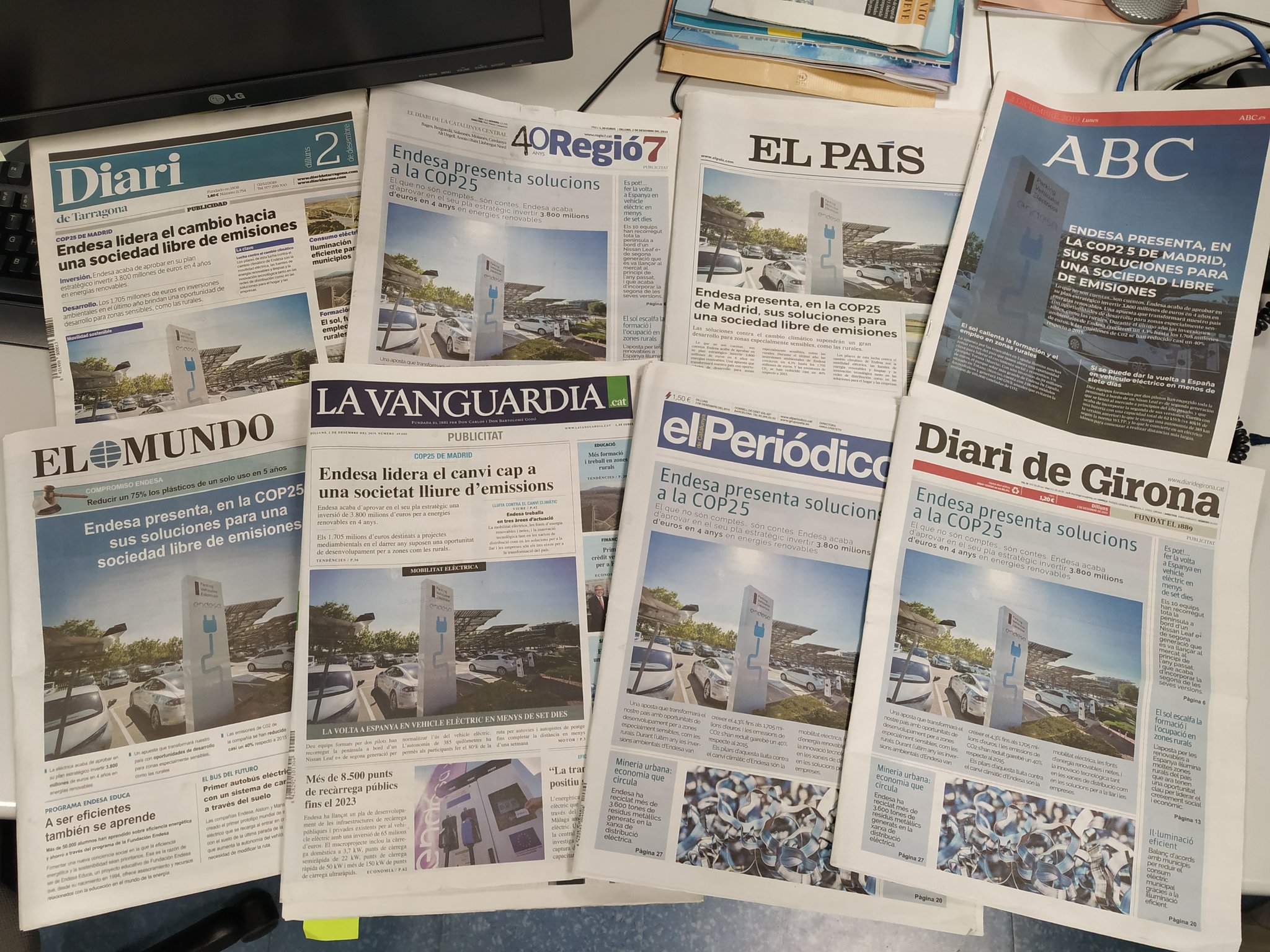Sign up for the daily CJR newsletter.
On December 2, as the UN climate conference began in Madrid, a Spanish energy company bought the covers of at least eight leading Spanish newspapers. The company, Endesa, replaced headlines with sponsored content touting its environmental record.
The visual effect was striking. At Spanish newsstands that morning, a drab stock image of electric cars charging appeared as the lead photograph of most of Spain’s major dailies and some smaller outlets. Delegates on their way to the first day of the climate conference may have seen what appeared to be a media consensus that “Endesa Presents Solutions”—an unlikely departure from the partisan cacophony the Spanish press usually trades in.
Politicians and members of local media worry that the gas company’s ad buy means editors are so financially strapped, they can no longer refuse advertisers, even ones that may present a conflict of interest: how do you sell the front page on Monday morning, to a company you have to cover for Monday night?
🍃 Avui @Endesa ha comprat les portades de toooots els diaris per anunciar una "societat lliure d'emissions" de CO2.
🔥 Divendres un informe independent deia que @Endesa que és l'empresa espanyola que més CO2 emet, triplicant la segona: https://t.co/J9UcmkUAlj pic.twitter.com/CAhxqj4Ml4
— Xavi Rossinyol (@XaviRossinyol) December 2, 2019
Like most sponsored content, the advertisements were clearly labeled, but at a glance the design closely resembled the usual front pages. An Endesa spokesperson said the company had disclosed to publishers that it intended to buy the covers of multiple outlets and that they came relatively cheap.
Spanish newspapers participating in the campaign have avoided public comment. Several declined to speak to CJR, and others did not respond to efforts to contact them. Most of Spain’s large papers are owned by a small number of publishing groups, and corporate officers—rather than editors at the papers—negotiate and control advertising buys.
Some staff reporters have commented publicly, risking their jobs. Lucia Mendez, a prominent columnist at El Mundo, a national daily, expressed dismay while acknowledging economic reality. “These aren’t moments to lecture about journalistic ethics and morals,” she wrote on Twitter. “Let he who is without sin cast the first stone. But I can’t get used to seeing this without shuddering.”
Though buying the covers of print newspapers isn’t a new practice in Spain, it’s uncommon to buy all of them at once, said Maria Ramirez, who leads strategy at Eldiario.es, a Spanish digital magazine. (Eldiario has previously run advertising from Endesa, but was not approached during the climate conference. Online outlets, where advertising is typically easier to identify, didn’t participate in the campaign, though Endesa does advertise widely online.) “The campaigns are the only that we’ve seen that have been so coordinated, and so similar,” she says. “In exactly the same format, it is quite weird.”
In 2015, a major Spanish bank, Banco Santander, successfully bought most Spanish front pages on the same day. Coca Cola has also purchased simultaneous front pages in multiple Spanish dailies. However, the timing of Endesa’s campaign with the climate conference has sparked the greatest criticism, including from some Spanish politicians.
“These covers don’t reflect badly on Endesa, which has every right to buy them for publicity,” wrote Pablo Iglesias, a candidate for Spain’s vice presidency, in a tweet. “But I think it does a lot of damage to the prestige of the press.”
Ramirez, the Eldiario strategist, says a tough story on Endesa’s daily business practices might be even more impactful now: “I’m curious to see if someone is going to publish something really in depth, just to prove that news and advertising really are separate things.”
Has America ever needed a media defender more than now? Help us by joining CJR today.







